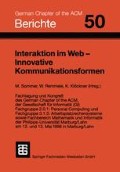Abstract
In this paper we introduce a workflow management system, called WebFlow, which is based on the world wide web and Java as its basic technologies. Java is used as the build time (modeling) language to define workflows as well as the implementation language for the run time workflow enactment. Due to the object-orientation of Java modular and extendible workflow types are possible. Modification of workflows is supported even at run time. Using WWW and Java eases the implementation effort of the workflow engine, since HTTP and the Java API already include functionality which needs not to be implemented anew. This is uploading and downloading of workflow applets and documents, authentication of clients, digital signing and especially the execution of workflows at the client site by the Java virtual machine. Thus, a very simple control server is sufficient, since the applets constituting the workflow coordinate themselves to a large extent. Webflow aims at application scenarios requiring flexible and modifiable workflows. It supports workflows which cross organizational boundaries, since it only relies on standard WWW mechanisms.
Access this chapter
Tax calculation will be finalised at checkout
Purchases are for personal use only
Preview
Unable to display preview. Download preview PDF.
References
S. Jablonski, C. Bussler: Workflow Management Modeling Concepts, Architecture and Implementation, London, International Thomson Computer Press, 1996.
K. Arnold, J. Gosling: The Java Programming Language. ACM Press Books, Addison Wesley Longman, 1996.
T. Lindholm, F. Yellin: The Java Virtual Machine Specification. ACM Press Books, Addison Wesley Longman, 1996.
Workflow Management Coalition: Terminology & Glossary. Document No. WFMC-TC-1011, Issue 2.0, June, 1996.
A. Carzaniga, G. Picco, G. Vigna: Designing Distributed Applications using the Mobile Code Paradigms. International Conference on Software Engineering, 1997.
Sun Microsystems: The Java Servlet API White Paper. Technical report, Sun Microsystems, available from http://www.jserv.javasoft.com/products/java-server/webserver/betal.0/doc/index.html 1997.
D. Flanagan: Java in a Nutshell. O’Reilly, 1996.
J. White: Mobile Agents White Paper, available from http://www.genmagic.com/agents/Whitepaper/whitepaper.html, 1996.
D. Lange: Programming Mobile Agents in Java - A White Paper. IBM Corp., available from http://www.ibm.co.jp/trl/aglets/whitepaper.htm, 1996.
Sun Microsystems: The Java Development Kit 1.1 Documentation. Technical report, Sun Microsystems, available from http://www.java.sun.com:80/products/jdk/1.1/docs/index.html, 1996.
HTTP Working Group: Hypertext Transfer Protocol — HTTP/1.1, Internet Draft, <draft-ietf-http-vl1spec-07>, 1996.
B. Karbe, N. Ramsperger, P. Weiss: Support of Cooperative Work by Electronic Circulation Folders. Conference on Office Information Systems, 1990.
C. Ellis, C. Maltzahn: The Chautauqua Workflow System. Hawaii International Conference on System Sciences, 1997.
C. Ames, S. Burleigh, S. Mitchell: WWWorkflow: World Wide Web based Workflow. Hawaii International Conference on System Sciences, 1997.
J. Ousterhout: Tcl and the Tk Toolkit. Addison-Wesley, 1994.
T. Cai, P. Gloor, S. Nog: DartFlow: A Workflow Management System on the Web using Transportable Agents. Technical Report PCS-TR96–283, Dartmouth College, 1996.
A. Schill, C. Mittasch: CodAlf: A Decentralized Workflow Management System on Top of OSF DCE and DC++. 3rd International Symposium on Autonomous Decentralized Systems, 1997.
C. Mittasch et al.: Design and Use of BPAFrame — a Decentralized CORBA-based Workflow Management System. World Computer Congress, 1996.
G. Alonso, D. Agrawal, A. Abbadi, K. Kamath, R. Günthör, C. Mohan: Exotica/FMQM: A Persistent Message-Based Architecture for Distributed Workflow Management. IFIP Working Conference on Information Systems for Decentralized Organizations, 1995.
Author information
Authors and Affiliations
Editor information
Editors and Affiliations
Rights and permissions
Copyright information
© 1998 Springer Fachmedien Wiesbaden
About this chapter
Cite this chapter
Weber, M., Illmann, T. (1998). Using Java for the Coordination of Workflows in the World Wide Web. In: Sommer, M., Remmele, W., Klöckner, K. (eds) Interaktion im Web — Innovative Kommunikationsformen. Berichte des German Chapter of the ACM, vol 50. Vieweg+Teubner Verlag, Wiesbaden. https://doi.org/10.1007/978-3-663-05852-6_2
Download citation
DOI: https://doi.org/10.1007/978-3-663-05852-6_2
Publisher Name: Vieweg+Teubner Verlag, Wiesbaden
Print ISBN: 978-3-519-02691-4
Online ISBN: 978-3-663-05852-6
eBook Packages: Springer Book Archive

